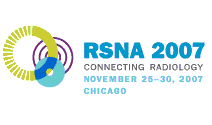
Abstract Archives of the RSNA, 2007
LL-VI6107-R07
Development of a New Respiratory Synchronization System (Motion Adaptive Gate) with Segment True FISP and Its Clinical Usefulness in Non-contrast-enhanced MRA of Renal Arteries
Scientific Posters
Presented on November 29, 2007
Presented as part of LL-VI-R: Vascular Interventional: MRA
Hisashi Kitagawa, Presenter: Nothing to Disclose
Noriatsu Ichiba MD, Abstract Co-Author: Nothing to Disclose
Daichi Hayashi MD, Abstract Co-Author: Nothing to Disclose
Norio Nakata MD, Abstract Co-Author: Nothing to Disclose
Chiaki Imura, Abstract Co-Author: Nothing to Disclose
Kunihiko Fukuda MD, Abstract Co-Author: Nothing to Disclose
We developed a new respiratory synchronization system (Motion adaptive gate system) which has a learning ability. It is expected that this system enables us to improve precision of synchronization and reduce the time taken to complete a scan. We hereby report development of the Motion adaptive gate with Segment True FISP and its clinical usefulness in non-contrast enhanced MRA of renal arteries.
Apparatus:SIEMENS MAGNETOM Avanto 1.5T(1)Motion adaptive gate with Segment True FISP(MAG-SegTrueFISP):Slice thickness=1.5mm, TR=250msec, TE=1.54msec, FA=90deg, Scan time=approx. 5mins. Subjects: Healthy volunteers (approved by the Institutional Review Board)
Parameter optimization: 1) k-space filling (Linear, Centric), 2) FA(10-90 degrees), 3) Number of segments (10-70).Evaluation: Calculation of the value of CNR from the SNR of renal arteries and signals from surrounding tissue.(2)Subjects: 10 patients with suspected renal artery stenosis underwent both MAG-Segment True FISP and contrast-enhanced MRA in the same period. The sequence used with the contrast-enhanced MRA was as follows: 3D-FLASH:TR=3.23msec, TE=1.23msec,Slice thickness=2.5mm,scan time=6sec/phase
Our newly developed Modified-MAG-Seg-True-FISP used the following parameters: k-space filling = linear, FA= 90deg, Segment = 70. Time taken to complete a scan was between 3 and 5 minutes.In Modified-MAG-Seg-True FISP, it was noted that turbulent blood flow in kinky blood vessels could cause artificial signal reduction and lead to overdiagnosis of stenosis. Setting the contrast-enhanced MRA as the gold standard, the Modified-MAG-Seg-True FISP had the sensitivity of90-100%,and the accuracy of 89-94%.
The Modified-MAG-Seg-True FISP has the sensitivity, specificity and the accuracy which are equivalent to those of contrast-enhanced MRA in making the diagnosis of renal artery stenosis or occlusion. We developed a new imaging technique which costs less to perform and can be safely used in patients who are allergic to contrast agents or in renal failure patients with nephrogenic systemic fibrosis (NSF) because of lack of need to use contrast agents.
This tecnique has usefuly in non enhance Renal MRA.
Kitagawa, H,
Ichiba, N,
Hayashi, D,
Nakata, N,
Imura, C,
Fukuda, K,
Development of a New Respiratory Synchronization System (Motion Adaptive Gate) with Segment True FISP and Its Clinical Usefulness in Non-contrast-enhanced MRA of Renal Arteries. Radiological Society of North America 2007 Scientific Assembly and Annual Meeting, November 25 - November 30, 2007 ,Chicago IL.
http://archive.rsna.org/2007/5008473.html

